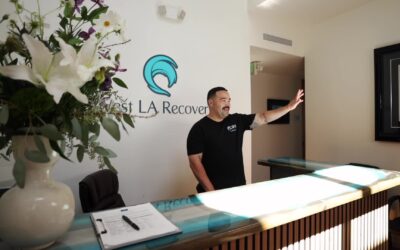How Can You Recognize the Need for Therapy in Addiction Recovery?

Addiction causes a lot of damage that goes beyond just using a substance. It affects your body, mind, and emotions in significant ways:
- Your physical health gets worse due to harm to your organs, trouble sleeping, and a weakened immune system.
- Your mental clarity is affected by anxiety, depression, and difficulties with thinking.
- Your emotional stability crumbles as feelings of shame, guilt, and isolation take over your everyday life.
Should I try therapy for my addiction? You might start asking yourself this question when you see these warning signs piling up in your life. To understand when therapy for addiction is necessary, you need to honestly assess your current situation. As these symptoms worsen, you may also wonder “where can I try therapy for addiction?”
The signs that therapy is right for you become clearer when you realize that willpower alone isn’t enough to achieve lasting recovery. Therapy for addiction is an active step you take instead of waiting until things get worse. With professional help, you’ll receive organized support, treatments backed by research, and complete care that tackles the underlying issues behind your addictive behaviors.
Should I go to therapy for addiction recovery? The answer becomes clear when you remember that addiction recovery involves more than just quitting substance use—it requires rebuilding how you relate to yourself and the world around you.
As we approach Recovery Month 2025, it’s the perfect time to make a move. This yearly campaign reminds us that asking for help shows strength, not weakness. With the right therapeutic support system in place, you can kickstart your healing journey today.
1. Loss of Control Over Substance Use
Loss of control addiction is one of the most clear signs of substance use disorder that therapy is necessary. You may find it difficult to stop using even though you genuinely want to quit or reduce your consumption. This pattern often starts off slowly – maybe you meant to have just one drink but ended up having much more, or you promised yourself you’d only use substances on weekends but discovered that you’re using every day.
The inability to manage your substance use despite negative consequences indicates a deeper dependency issue that goes beyond willpower alone. Your brain’s reward system has been changed by repeated substance use, making it harder and harder to make logical decisions about how much you consume. You might notice:
- Unsuccessful attempts to quit or cut back
- Using more than you intended
- Spending too much time getting, using, or recovering from substances
- Continuing to use even though you know it’s causing problems
When self-management fails over and over again, it’s important to seek professional help. Therapy offers organized support and proven strategies that tackle the neurological and psychological parts of addiction that you can’t overcome just by being determined.
2. Physical and Mental Health Issues Caused by Addiction
Addiction health effects go beyond just the temporary high, causing serious problems in both your body and mind. When someone uses substances for a long time, it can harm different organs like the liver, heart, and lungs, which may require urgent medical treatment.
The impact on mental health is just as severe. Anxiety depression addiction creates a harmful cycle where drugs or alcohol initially numb mental health issues but eventually make them worse. Here are some common psychological effects you might face:
- Ongoing anxiety attacks and panic disorders
- Severe depression that disrupts daily life
- Difficulty with memory and decision-making
- Sleep problems and constant tiredness
Organ damage addiction can show up as conditions like hepatitis (inflammation of the liver), kidney dysfunction, or irregular heartbeats that pose risks to your long-term health. These physical issues need specialized medical care along with addiction treatment.
Therapy plays a crucial role in addressing both aspects of recovery—substance abuse and mental health. Integrated care approaches ensure that while you receive treatment for your addiction, any co-existing mental health conditions are also taken care of. This way, doctors can focus on healing your body while therapists help you build healthy ways to cope with emotional struggles.
3. Neglecting Responsibilities at Work, School, or Home Due to Addiction
Addiction impact responsibilities becomes evident when substance use begins consuming the time and mental energy you once dedicated to essential obligations. You might find yourself calling in sick frequently, missing important deadlines, or struggling to concentrate during meetings. Students often see their grades plummet as assignments go unfinished and classes are skipped.
At home, the work school home neglect addiction pattern manifests through:
- Unpaid bills piling up on your desk
- Children’s needs going unmet
- Household chores abandoned for days or weeks
- Important family events missed or forgotten
The ripple effect extends beyond immediate consequences. Colleagues lose trust in your reliability, academic probation threatens your educational goals, and family members feel abandoned or resentful. Your professional reputation suffers, relationships strain under the weight of unmet expectations, and financial stability crumbles.
Therapy for Addiction provides structured support to rebuild these fractured areas of your life. Through cognitive-behavioral techniques and accountability frameworks, you can develop systems that restore your ability to meet commitments and regain the respect of those who depend on you.
4. Experiencing Withdrawal Symptoms Without Substances – A Sign You Need Therapy for Addiction
Your body’s reaction when substances are absent reveals the depth of physical dependence. Withdrawal symptoms addiction creates a cycle where you feel compelled to use simply to avoid discomfort, signaling that professional intervention has become necessary.
Physical withdrawal signs therapy need include:
- Nausea and vomiting
- Severe headaches and body aches
- Irritability and mood swings
- Tremors or shaking
- Sleep disturbances and fatigue
- Anxiety and panic attacks
These symptoms indicate your body has adapted to function with substances present. When you attempt to stop, your system struggles to maintain balance without chemical assistance. This physical dependence requires medical attention – attempting to manage withdrawal alone can be dangerous and often leads to relapse.
Medically supervised detoxification within our therapy programs provides safe, comfortable withdrawal management. You receive 24/7 monitoring, medication to ease symptoms, and immediate access to counseling support. This integrated approach addresses both the physical aspects of withdrawal and the psychological components driving your addiction, creating a foundation for sustainable recovery rather than temporary abstinence.
5. Strained Relationships Due to Addiction Behaviors – Why Therapy Can Help Heal Your Connections
Addiction relationship strain becomes evident when substance use consistently takes priority over meaningful connections with family and friends. You may notice broken promises, missed important events, or heated arguments that stem from your substance use patterns. Trust erodes as loved ones witness repeated cycles of commitment followed by disappointment.
Communication breakdowns often intensify as addiction progresses. You might find yourself:
- Becoming defensive when confronted about your substance use
- Isolating from family gatherings or social events
- Lying about your whereabouts or activities
- Experiencing increased conflict during conversations
Family friend conflicts addiction therapy help addresses these damaged relationships through structured therapeutic interventions. Individual counseling helps you understand how your behaviors impact others, while family therapy sessions create safe spaces for honest dialogue. Support groups provide additional perspectives from others who’ve navigated similar relationship challenges.
Involving your family members in the recovery process can accelerate healing when they’re willing participants. Therapy equips both you and your loved ones with communication tools, boundary-setting strategies, and realistic expectations for the recovery journey ahead.
6. Increasing Tolerance Requiring More Substance Use for Effect – Understanding the Need for Therapy in Addiction Recovery
Increasing tolerance addiction develops when your body adapts to a substance, requiring progressively larger amounts to achieve the same effects you once experienced with smaller doses. This biological adaptation creates a dangerous cycle that significantly elevates your risk of overdose, as you push your system beyond safe limits.
Substance tolerance therapy necessity becomes evident when you notice yourself consuming double, triple, or even higher quantities than when you first began using. This escalation represents a clear warning sign that your addiction severity has intensified beyond casual use patterns.
The physiological changes occurring in your brain during tolerance development require professional intervention. Therapy for Addiction addresses both the physical dependence your body has developed and the behavioral patterns driving continued use. Evidence-based treatment approaches include:
- Medication-assisted treatment to manage withdrawal and cravings
- Cognitive-behavioral therapy to reshape thought patterns
- Medical monitoring during detoxification
- Relapse prevention strategies tailored to your specific triggers
When tolerance reaches dangerous levels, attempting recovery without professional support puts you at significant risk for complications during withdrawal and increases the likelihood of relapse.
7. Financial or Legal Problems Resulting from Addiction – How Therapy Can Help You Rebuild Your Life
Addiction creates devastating ripple effects that extend far beyond personal health. You might find yourself draining savings accounts, maxing out credit cards, or losing steady employment due to substance-related absences and performance issues. The consequences addiction behavior therapy can address include:
- Mounting debt from purchasing substances or neglecting bill payments
- Job termination resulting from impaired work performance or attendance
- Legal fees from DUI charges, possession arrests, or other substance-related offenses
- Property damage costs from accidents or poor judgment while under the influence
Legal complications compound financial stress when addiction drives risky behaviors. You may face criminal charges, license suspensions, or civil lawsuits that create long-term consequences affecting employment opportunities and housing options.
Therapy provides structured support to rebuild your financial stability and legal standing. Our counselors help you develop budgeting skills, explore vocational rehabilitation programs, and create accountability systems that prevent future legal troubles. Through cognitive-behavioral therapy and practical life skills training, you can address the underlying thought patterns that led to destructive financial and legal decisions.
Exploring Therapy Options Available for Addiction Recovery in Los Angeles
Los Angeles offers a wide range of therapy options that residents can access to support their recovery journey. Understanding these addiction treatment programs helps you make informed decisions about your care.
1. Individual Counseling
Individual Counseling provides personalized attention where you work one-on-one with licensed therapists to address underlying causes of addiction, develop coping strategies, and process trauma or mental health concerns.
2. Group Therapy
Group Therapy connects you with peers facing similar challenges, creating supportive environments where shared experiences foster healing and accountability. These sessions often focus on specific topics like relapse prevention or family dynamics.
3. Medication-Assisted Treatment (MAT)
Medication-Assisted Treatment (MAT) combines FDA-approved medications with counseling to treat substance use disorders, particularly effective for opioid and alcohol dependencies. This approach addresses both physical withdrawal symptoms and psychological aspects of addiction.
4. Residential Programs
Residential Programs LA facilities offer intensive, 24/7 care in structured environments. These programs typically include medical supervision, individual therapy, group sessions, and life skills training.
Specialized Services
Specialized services cater to unique populations:
- Veterans receive trauma-informed care addressing service-related PTSD and substance use
- Trauma survivors access specialized therapies like EMDR and cognitive processing therapy
- Dual diagnosis programs treat co-occurring mental health conditions alongside addiction
When asking yourself “Is therapy right for me?” consider your specific needs, severity of addiction, support system, and personal preferences. Matching treatment intensity to your situation increases success rates and ensures appropriate care levels.
Taking Action Now – Preparing for Recovery Month 2025 with Therapy for Addiction in Los Angeles
Recovery Month 2025 represents more than just awareness—it’s your opportunity to transform recognition into action. This annual celebration serves as a powerful catalyst for individuals ready to plan recovery journey with therapy now rather than waiting for the “perfect” moment that may never come.
The momentum surrounding Recovery Month creates an ideal environment for beginning your healing journey. Communities across Los Angeles will host events, share success stories, and highlight available resources, making it easier to connect with others who understand your experience. You can use this collective energy to fuel your commitment to change.
Starting your exploration of therapy options for addiction in Los Angeles before Recovery Month arrives gives you several advantages:
- Time to research different treatment approaches without pressure
- Opportunity to schedule consultations and assessments
- Ability to prepare mentally and emotionally for treatment
- Chance to arrange work or family responsibilities around your recovery schedule
Addiction therapy in Los Angeles offers diverse pathways to healing, including holistic options, and early preparation allows you to make informed decisions about your care. You don’t need to wait for September to begin this process—taking steps now positions you for success during Recovery Month and beyond.
The signs we’ve discussed throughout this article aren’t meant to create fear—they’re meant to empower you with knowledge. If you’ve recognized yourself in any of these seven indicators, you already possess the most crucial element for recovery: awareness.
Contact us today at West LA Recovery to discuss your pathway toward healing through our comprehensive treatment approach, including aftercare support designed specifically for sustained sobriety post-treatment completion. Your recovery journey can begin right now and with our guidance on maintaining sobriety, we can help ensure that your progress continues well beyond Recovery Month.
FAQs (Frequently Asked Questions)
How can I recognize the need for therapy in addiction recovery?
Recognizing the need for therapy involves identifying signs such as loss of control over substance use, physical and mental health issues like anxiety or depression, neglecting responsibilities at work, school, or home, experiencing withdrawal symptoms, strained relationships due to addiction behaviors, increasing tolerance requiring more substance use, and financial or legal problems. Therapy is a proactive step toward healing and recovery, addressing both physical and emotional challenges caused by addiction.
What are the common signs that indicate therapy is right for my addiction?
Common signs include an inability to stop or reduce substance use despite wanting to, experiencing withdrawal symptoms like nausea or irritability without substances, neglecting daily responsibilities, strained relationships with family or friends, increasing tolerance leading to higher substance use, and facing financial or legal difficulties due to addiction. These signs suggest deeper dependency issues that benefit from professional therapy.
How does addiction affect physical and mental health, and how can therapy help?
Addiction can lead to serious health complications such as anxiety, depression, organ damage, and other physical ailments. Therapy plays a crucial role in addressing these symptoms through integrated care programs that combine medical treatment with psychological support. This comprehensive approach helps individuals manage both the physiological effects of addiction and the associated emotional challenges.
What types of therapy options are available for addiction recovery in Los Angeles?
Los Angeles offers various therapy options including individual counseling, group therapy sessions, medication-assisted treatment (MAT), and residential treatment centers. Specialized services are also available for veterans or individuals with trauma histories. Choosing the right program depends on personal needs and circumstances. Facilities like West LA Recovery Center provide comprehensive treatment approaches tailored to support sustained sobriety.
Why is experiencing withdrawal symptoms a sign I need professional therapy for addiction?
Withdrawal symptoms such as nausea, headaches, irritability, or other physical discomforts indicate physical dependence on substances. These symptoms signal that self-management may not be sufficient and professional support is necessary. Medically supervised detoxification within therapy programs ensures safety during withdrawal and lays the foundation for effective long-term recovery.
How can therapy help rebuild relationships strained by addiction behaviors?
Addiction often damages trust and communication with loved ones leading to conflicts and isolation. Therapy offers counseling and support groups aimed at healing these interpersonal connections. Involving family members in the recovery process when appropriate fosters understanding and strengthens support systems essential for lasting sobriety.







